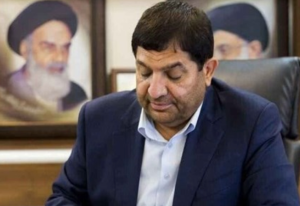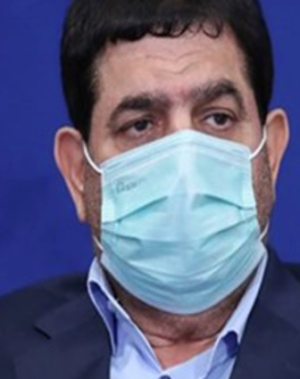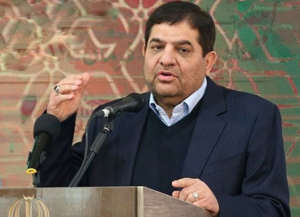Mohammad Mokhber: First Vice President of Iran
Download PDFPage Navigation
Mohammad Mokhber Dezfuli currently serves as the first vice president of Iran in President Ebrahim Raisi’s Administration. Before this position, his leadership roles at massive business conglomerates—the Mostazafan Foundation and the Execution for Imam Khomeini’s Order (EIKO)—implicated him in the corruption at the heart of Supreme Leader Khamenei’s domestic political strategy. The Supreme Leader appointed him as the head of EIKO to oversee a large patronage network. Mokhber was also responsible for implementing Khamenei’s vision of a resistance economy to neutralize international sanctions. Furthermore, he oversaw efforts to punish regime enemies by seizing their property. If his past is any indication of his future, his current role in the elected branch of government will be used to perpetuate corruption, implement a resistance economy, and punish regime enemies.
Early Years
Mokhber was born on September 1, 1955 in Dezful, Khuzestan Province. His father Abbas was a well-known cleric. Mokhber received his primary education in Dezful and Ahvaz, and later obtained a doctorate in international law. Mokhber served as an officer in the Islamic Revolutionary Guard Corps’ (IRGC) medical corps during the Iran-Iraq War. In the nineties, he worked as the CEO of Dezful Telecommunications before he became deputy governor of the Khuzestan Province. In the early 2000s, then-head of the Mostazafan Foundation, Mohammad Forouzandeh, appointed him as commercial vice president of the Mostazafan Foundation. Soon after, he became chairman of Sina Bank’s board of directors. He held that position for approximately ten years. As chairman, Mokhber had influence over Mostazafan Foundation’s finances, given that Mostazafan Foundation owns the majority of Sina Bank’s shares.
Mostazafan Foundation
 Mohammad Mokhber with portraits of Supreme Leader Khomeini and Supreme Leader Khamenei in the background
Mohammad Mokhber with portraits of Supreme Leader Khomeini and Supreme Leader Khamenei in the background
From his time at the Mostazafan Foundation and Sina Bank, Mokhber gained managerial experience in a multi-billion-dollar business enterprise that advances the Supreme Leader’s priorities. The Mostazafan Foundation’s leaders frequently tout claims that the organization provides for the needy. At the same time, they use the purported charity, also known as an Iranian Bonyad, to distribute wealth to regime elites in exchange for their loyalty to the Supreme Leader. As commercial vice president at Mostazafan Foundation, Mokhber formed relationships with religious and political elites in the Supreme Leader’s patronage network. He also developed contacts in the Office of the Supreme Leader, which has direct control over the Mostazafan Foundation.
As chairman of Sina Bank’s board of directors, Mokhber oversaw the bank’s financing of the regime’s most objectionable behavior, including its ballistic missile and nuclear programs. The European Union (E.U.) exposed his links to these programs in 2010 when it levied sanctions against him and Sina Bank. The U.S. also designated Sina Bank in 2010 for being owned by the government of Iran. Furthermore, in 2018, the U.S. Department of Treasury sanctioned Sina Bank under counterterrorism authority Executive Order (E.O.) 13224 and revealed that Sina Bank financed the Basij, a volunteer paramilitary unit within the U.S.-designated terrorist organization the IRGC. In November 2020, the U.S. sanctioned the Mostazafan Foundation and pointed out that the Bonyad expropriates wealth from Iranian citizens. The latter human rights abuses provided experience that would later apply to Mokhber’s role of overseeing property seizures at EIKO.
Mokhber’s ability to advance Iran’s strategic interests and finance terrorism was not limited to his role at Sina Bank. He also leveraged his position at Mostazafan Foundation to obtain South African telecommunications company MTN’s support in acquiring defense equipment, swaying a vote at the United Nations (U.N.) on Iran’s nuclear program, and possibly funding terrorist organizations, including Hezbollah and the IRGC. According to MTN, Mokhber requested that MTN help the Islamic Republic acquire defense equipment. In exchange, he would use his influence at the Mostazafan Foundation—a major shareholder of the Iran Electronic Development Company (IEDC)—and at the IEDC to break the IEDC’s obligations with Turkcell, a mobile phone operator based in Turkey. Turkcell alleged that it lost the contract to MTN because of MTN’s use of bribery and other corrupt acts, including promising to influence South Africa’s vote at the U.N.’s International Atomic Energy Agency’s vote on Iran’s nuclear program.
In June 2021, a U.S. lawsuit was initiated, alleging that MTN (along with ZTE, a Chinese telecommuniations company partially owned by the Chinese government) helped “fund and arm Hezbollah, Jaysh al-Mahdi, and the IRGC, including the Qods Force.” The complaint went on to argue that “the defendant MTN Irancell is a joint venture between MTN Group, which has a 49 percent stake and is not in charge, and the Bonyad Mostazafan and [IEDC], which collectively own a 51 percent stake and are fronts for the IRGC, including the Qods Force.” The lawsuit claimed that MTN’s business with the IRGC resulted in the injury and death of thousands of Americans between 2011 and 2016.
Thus, from early in his career path, Mokhber was implicated in a corruption scandal that tied the Mostazafan Foundation to the IRGC. The sanctions against Sina Bank revealed that he was involved in financing Iran’s ballistic missile and nuclear programs and state-sponsored terrorism. He could conduct these activities without any oversight other than that of the Office of the Supreme Leader, because the Mostazafan Foundation’s finances are shielded from external audits according to Iranian law. Mokhber became a skilled financial manager at the Mostazafan Foundation and Sina Bank, and was awarded for his performance and loyalty to the Supreme Leader with an appointment to lead another wealthy Bonyad in 2007—the Execution of Imam Khomeini’s Order (EIKO).
Head of Execution of Imam Khomeini's Order
Like the Mostazafan Foundation, EIKO serves several functions under the control of the Office of the Supreme Leader. At the head of EIKO, Mokhber oversaw the forceful displacement of Iranian citizens through property seizures. Thus, his exposure at the Mostazafan Foundation to expropriating wealth from the Iranian people would apply directly to his new position. EIKO has relied on such expropriations for a large share of its wealth. Reuters reported in 2013 that EIKO controlled $95 billion-worth of assets built on “the systematic seizure of thousands of properties belonging to ordinary Iranians.”
EIKO's Property Seizures
Since Mokhber became head of EIKO, the Bonyad has accelerated its ruthless attacks on minority groups viewed as regime enemies. On countless occasions, the Bonyad has repossessed properties belonging to Christians or Bahais, often with the backing of Iranian courts. For example, in 2016, an Iranian appeals court upheld a confiscation order in favor of EIKO, leading to the eviction of the protestant organization Jamaat-e Rabbani Church Council from a valuable piece of property near Tehran two years later. EIKO has displaced entire Bahai communities, often arguing that they were members of a “perverse sect of Bahaism.” These property seizures are so pervasive that, in the words of one human rights lawyer, they are part of a concerted effort to “gradually commit genocide” against Bahais.
The victims of EIKO’s property seizures are often religious minorities. However, the Iranian people, more broadly, also incur costs. EIKO obtains wealth by virtue of tax exemptions, public funding, preferential interest rates on loans, and regulatory protection from private sector competition. However, a large share of that wealth does not return to the Iranian people. At the helm of EIKO for 14 years, Mokhber managed the distribution of these resources to regime insiders, and thus he often failed to deliver on promises that he made on behalf of his purported charity to the Iranian people, including promises to mass-produce a Covid-19 vaccine.
Covid-19 Vaccines
EIKO is not the charity that it claims to be. It does carry out some charity activities, and as its leader, Mokhber often touted such accomplishments. Mokhber once said, "EIKO has concentrated its entire capacity to empower people economically, especially in the deprived areas.” However, this is window-dressing designed to provide the Bonyad with a veil of legitimacy. As the pandemic spread, Mokhber perpetuated false views about his organization’s vaccine production capabilities, aiming to convince people of the Bonyad’s public benefits and justify the flow of government funding.
 Mohammad Mokhber
Mohammad Mokhber
An EIKO-controlled entity known as the Barakat Foundation was tasked with developing and producing a Covid-19 vaccine. Mokhber formed the Barakat Foundation early in his tenure at EIKO at the Supreme Leader’s request. Under Mokhber’s leadership, the organization became one of the wealthiest entities under EIKO’s control. Further underscoring this entity’s importance, EIKO’s board of directors selected the former head of the Barakat Foundation, Aref Nourzi, to lead EIKO after Mokhber stepped down to become first vice president in 2021. Mokhber promised that the Barakat Foundation would produce tens of millions of doses of the vaccine, CovIran Barakat. Yet, approximately a year after CovIran Barakat was ready for use, it accounted for 3.8 million of the 37.8 million doses administered, raising questions about where the government funding went. Then, a reformist member of parliament, Ali Tajernia, alleged that the Barakat Foundation had received a $1 billion payment before delivering its vaccine. The head of public relations at Shifa Pharmed—the Barakat Foundation subsidiary tasked with vaccine production—vehemently denied that it had received the advance payment.
The Resistance Economy
The Supreme Leader’s approach to vaccine production resembles his vision of a resistance economy in that both emphasize domestic production, as opposed to imports from abroad. He tasked Mokhber with overseeing vaccine production, and implementing the resistance economy. At the head of EIKO, Mokhber was positioned to neutralize the impact of international sanctions via domestic investment, particularly in the energy sector. However, as an immense business enterprise with financial interests in many of Iran’s key economic sectors, EIKO plays a crucial role in developing the domestic economy more broadly. Partly because of his understanding of the resistance economy, the Supreme Leader backed Mokhber’s subsequent political career.
The First Vice President of Iran
 Mohammad Mokhber
Mohammad Mokhber
Mokhber’s experience as a Khamenei EIKO appointee likely secured his first vice presidency, given Raisi’s lack of experience in economic affairs. Mokhber was Raisi’s first personnel selection after taking office in early August 2021. The first part of this section discusses some of Mokhber’s roles as first vice president. The second part looks at the competition between Mokhber and economic officials in the Raisi Administration, and shows how Mokhber has emerged as a powerful actor in the administration.
Mokhber's Roles in the Administration
The first vice president of Iran is the second most powerful person in the elected branch of government after the president. He is slated to chair cabinet meetings in the president's absence and coordinate the other vice presidents’ activities. He participates in deliberations of the Supreme National Security Council (SNSC), which the president chairs. He would assume the presidency if the president were to become incapacitated, and the supreme leader approved. If Supreme Leader Khamenei died with Raisi and Mokhber in their current offices, and the Assembly of Experts then selected Raisi as Supreme Leader, Mokhber’s rise to the presidency would be possible.
As first vice president, Mokhber has been tasked with implementing the Supreme Leader’s domestic and foreign policy priorities, despite his lack of political and ministerial experience compared to his predecessor. Observers have noted that his predecessor, Eshaq Jahangiri, was “a member of parliament, governor of Isfahan Province, and a minister of industries and mines before he was tapped by Rouhani to be his second-in-command.” Mokhber was serving as a Supreme Leader appointee at the time of his appointment to the first vice presidency, and his only political experience was his stint as deputy governor of the Khuzestan Province. Nonetheless, Raisi asked Mokhber to implement the resistance economy. According to the office of the president, Raisi’s key mission for the first vice president is the development of a "strategic industrial plan and promotion of domestic production.”
Mokhber also travels inside Iran to shore up a political support base. For example, after the Metropol Towers collapsed in May 2022, he was quickly sent to Abadan to observe the damage and contain the unrest that followed accusations of corruption against officials involved in the building’s permitting. He proposed to “investigate” corruption, which he agreed was to blame for the building’s structural flaws. Ironically, Mokhber sat on the board of the Arvand Free Trade Zone, where the owner of the building had been accused of corruption on multiple occasions.
He has also been tasked with implementing foreign policy. In July 2022, he met Syria’s foreign minister in Tehran. He renewed Iran’s optimistic vows that Iran would soon expand economic integration with Syria—an expectation Iran will struggle to fulfill given its economic crisis at home. In October 2022, he was dispatched to Moscow with senior IRGC officials and an SNSC official to finalize an agreement for Iran to send drones and surface-to-surface missiles to Russia to support its war in Ukraine. In December 2022, Mokhber received Chinese Vice Premier Hu Chunhua in Tehran, days before Iran was voted out of the U.N. Commission on the Status of Women.
In addition to conducting diplomacy with strategic partner countries like Syria, Russia, and China, Mokhber occasionally meets terrorist commanders from the Iraqi Popular Mobilization Forces. And he, unlike Raisi, has also met with the director-general of the International Atomic Energy Agency (IAEA). Raisi’s predecessor Hassan Rouhani played a more hands-on role with the IAEA and occasionally met with the director-general.
Who Has Primacy within the Raisi Administration?
Mokhber competes with other Raisi appointees, namely Assistant for Economic Affairs Farhad Rahbar and Vice President for Economic Affairs Mohsen Rezaei, for influence in the administration. One analyst believed that Raisi preferred Rahbar as his choice for first vice president, because he was a conservative economics professor and former head of the powerful Management and Planning Organization in the Ahmadinejad Administration. Rahbar has executive governmental experience more akin to former first vice presidents, and he has substantial knowledge of the economy.
Some cabinet ministers reportedly do not know whether to answer to Mokhber or Rahbar. The influence of Rezaei further adds to the ministers’ confusion. The competing influence of Mokhber and Rezaei has paralyzed the Minister of the Economy Ehsan Khandouzi. Rezaei’s reported advocacy, along with other elements of the Iranian system, for reform amid the significant uprising enveloping Iran after the death of Mahsa Amini could further complicate disagreements.
Notwithstanding Rezaei’s clout, which derives from his pedigree, Mokhber has emerged as the more powerful of the two officials. Mokhber dismissed Rezaei (and Vice President for Executive Affairs Solat Mortazavi) from the Economic Commission in April 2022. Then, in December 2022, Mokhber ordered Khandouzi to refute Rezaei’s public statement that cash handouts would be doubled. Thus, First Vice President Mokhber has emerged as an economic policymaker and a powerbroker in the administration. Given his close relationship with the Supreme Leader, reaching back to his leadership of EIKO, his influence within the Raisi Administration is formidable.
Rezaei resigned as vice president for economic affairs in June 2023, and Raisi appointed him as head of the Supreme Council of Economic Coordination, tasked with coordinating economic policy among the three branches of the government. This was his second resignation from top posts in the Islamic Republic in under two years; in August 2021, he resigned as secretary of the Expediency Council, a body tasked with settling disputes between the Guardian Council and the Majles. The reasons for his resignation can be observed in the surrounding circumstances. His resignation as secretary of the Expediency Council preceded his appointment as vice president, which took place less than a month later. His resignation as vice president for economic affairs may have been crafted to relieve pressure on the Raisi Administration due to the ailing economy. However, his influence on economic policy at the Supreme Council of Economic Coordination should not be understated. This position could still conflict with Raisi’s economic team led by Mokhber.
Conclusion
For a large part of his career, Mokhber worked at important Bonyads implicated in Iran’s ballistic missile and nuclear programs, terrorism, corruption, mismanagement, human rights violations, and sanctions evasion. As chairman of Sina Bank’s board of directors, he directed funding toward nuclear proliferation activities at the behest of the Supreme Leader. At Mostazafan Foundation, he acted on bribes from MTN, and a subsequent U.S. lawsuit against MTN exposed the links between the Mostazafan Foundation, the IRGC, and IRGC-backed terrorist organizations responsible for the death of thousands of Americans in the Iraq War.
Mokhber used the vast wealth accumulated by EIKO—at the expense of the Iranian people—to reward regime insiders like himself. Managing the patronage network endeared him to the Supreme Leader, but at a cost. Mokhber consistently failed to deliver on promises to the Iranian people, as illustrated by the Covid-19 vaccine debacle. These failures undermine the legitimacy the Bonyad attempts to achieve through charity activities. In the context of international sanctions against Iran owing to the regime's malign activities, Mokhber champions the concept of a resistance economy, like other officials who dominate the Raisi Administration. He will continue to receive the Supreme Leader’s favor, and will thus remain an important powerbroker in the Raisi Administration, perpetuating the corruption and mismanagement at the root of the current economic crisis.
Receive Iran News in Your Inbox.
Eye on Iran is a news summary from United Against Nuclear Iran (UANI), a section 501(c)(3) organization. Eye on Iran is available to subscribers on a daily basis or weekly basis.
Receive Iran News in Your Inbox
The Iran nuclear deal is done. And the world's biggest companies have already visited Tehran ready to strike a deal when sanctions end. These businesses will add even more to Iran's bottom line. And that means continued development of nuclear technologies and more cash for Hamas and Hezbollah.